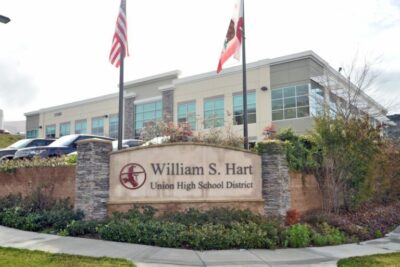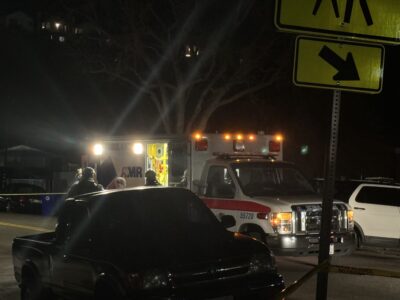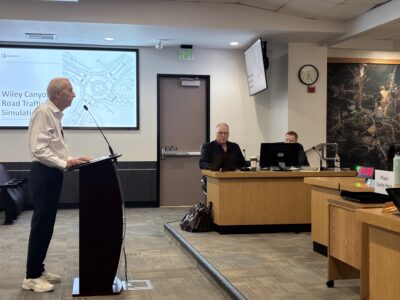The Master’s University is looking for the city of Santa Clarita’s help with $65 million in bond financing to restructure debt and continue a massive campus overhaul, according to city officials.
The university, not the city, would be liable for the bond debt and the city’s role in the financing would essentially be procedural, according to city officials.
Santa Clarita officials discussed TMU’s request with the City Council’s Development Committee — Councilwoman Marsha McLean and Councilman Jason Gibbs — before the first step in the city’s decision to put bonds on the market on behalf of the nonprofit university.
TMU is planning to use the funds to restructure its existing debt and potentially purchase additional surrounding residential properties ahead of a campus centennial celebration planned for 2027.
City officials described TMU’s request as similar to the financing plans for capital improvement at California Institute of the Arts and Henry Mayo Newhall Hospital, as well as a pair of lower-income housing projects.
What is TEFRA?
Michael Villegas, assistant to the city manager, said Tuesday’s discussion was just the first step in the process, a TEFRA hearing, named after the law that governs the steps, the Tax Equity and Fiscal Responsibility Act.
“The council would have to adopt a resolution saying you held a public hearing, but (the bond issuance) doesn’t affect the city’s credit rating,” said Villegas. “It’s not the city’s indebtedness. It doesn’t affect our bond capacity issuance. We’re simply holding the hearing and approving the fact that the hearing is held.”
The formality is “an IRS requirement for any nonprofit borrower seeking tax-exempt bonds through a conduit issuer,” according to the state treasurer’s office, which “allow members of the public to comment, contest, oppose, or support the use of tax-exempt bonds for a nonprofit borrower that is providing a public benefit.”
Gibbs asked if the hearing was something the council takes a vote on or if City Hall is just a placeholder.
“You don’t get a say,” City Manager Ken Striplin replied, “you’re just holding the hearing.”
City officials said the language in the request, in terms of what TMU is seeking to do with the funding, did have “a concern” the city is discussing with the college.
Striplin declined to be more specific regarding the concerns after Tuesday’s meeting.
“We’re just reviewing the language to make sure that financing is consistent with the master plan,” Striplin said, having told the council earlier that the financing component would come to the council before the new master plan request.
One of the questions brought up by the council members is whether the money would be used to purchase more residential properties in the area, a move the university has undertaken to the dismay of some local residents who feel the entirety of the equestrian community in Placerita Canyon is being converted to a college campus.
McLean asked if that was normal for bonds to be used to buy homes, and city officials responded that, while the process was used for a housing project, they couldn’t think of an example of when the funds were used to purchase homes.
Council members have supported TMU’s moves vocally, including numerous statements from Mayor Bill Miranda, who wore a TMU ball cap at a recent City Council meeting and said “perpetuity” isn’t a word he likes to use when he’s talking about special standards districts, in reference to residents’ concerns.
The eligible financing terms for TMU would be based on its credit rating, according to the state. In June, S&P Global Ratings assigned TMU its ‘BBB-‘ long-term rating to the California Municipal Finance Authority’s series 2025 revenue bonds. That’s the same rating given to Henry Mayo Newhall Hospital in January for its bonds.
Campus plans
TMU officials have not released any specifics about the purpose for the bonds other than a statement Monday in response to a question about the hearing.
It’s a more attractive way to finance capital improvement projects due to the much lower potential interest rate, and there’s certainly precedence, as city officials mentioned similar moves to assist in the expansion of California Institute of the Arts and Henry Mayo.
“As a nonprofit, Christian university, TMU is always looking for wise and responsible ways to care for our campus and serve our students,” wrote Mason Nesbitt, spokesman for TMU, in a text message Monday. “The TEFRA hearing is a standard step in the process of seeking tax-exempt financing — a common approach among nonprofit institutions to lower borrowing costs. If approved, this kind of financing can be used for strategic campus investments or to refinance past projects on more favorable terms, helping us steward our resources in a way that supports our mission and our students.”
Public Record Act requests submitted to City Hall have shed some light on the campus’ planned northern expansion, which has been long-awaited and contingent upon the $60 million extension of Dockweiler Drive, a two-year project expected to start later this year.
Conditional upon the completion of this second access point for the canyon, the campus is looking at “a 10-acre campus expansion” with five new buildings.
The plans include: a nearly 68-foot-tall, 40,612-square-foot chapel building set back a minimum of 150 feet from all surrounding property boundaries; a 33,442-square-foot practice gymnasium with support facilities and a basement cafeteria; two classroom buildings totaling 33,597 square feet — a science building and a math-kinesiology building; and a 4,642-square-foot student welcome center that would be located along Placerita Canyon Road. There would also be a 500-bed dormitory.
A draft of the bond’s plans mentions financing for: the existing residential properties located within the 22700 block of 8th Street; within the 24600 block of Meadview Avenue and between 24806 and 24864 of Meadview Avenue; within the 21700 block of Oak Orchard Road; within the 24700 block of Oakcreek Avenue; within the 21100, 21300, 21500 and 21600 blocks of Placerita Canyon Road; and between 21901 and 22040 on Placerita Canyon Road; between 20121 and 21157, 21571 and 21636, 21705 and 21759, and 21804 and 21926 of Placeritos Boulevard; within the 24600, 24700 and 24800 blocks of Quigley Canyon Road; within the 25100 block of Avenida Ignacio, and elsewhere within the boundaries of the Placerita Property Owners Association and/or adjacent to the university main campus at 21726 Placerita Canyon Road.
Next step
City officials indicated Tuesday that TMU is trying to move the process as quickly as possible in order to include the financing in its annual funding cycle, which ends in June. City officials indicated Tuesday the earliest that it could be before the council is July.
Once the formal request is made for a TEFRA hearing, which has not happened yet, a notice will be posted seven days prior to the hearing, in accordance with state law.
Striplin described Tuesday’s Development Committee meeting as a sort of heads up to the council that TMU would likely be making the request.
The request for the bond issuance isn’t out of the ordinary, Striplin said.
“This is unusual in the sense that there’s a master plan in place. There’s a series of things occurring. And there’s a new master plan,” Striplin said. “That’s why this is a little bit different.”
An analysis of the language TMU sent to the city ahead of the hearing request was not made immediately available upon request, but the wording is under discussion with the city.
“We’ve had the conversation,” Villegas said, regarding TMU’s plans for the funds. “Their intent is to refinance existing debt for properties already acquired. But given the way the language is written, it does give them flexibility to acquire more properties if they desire.”







